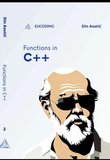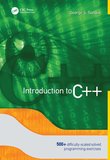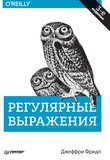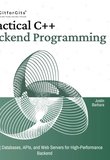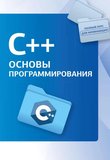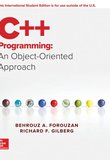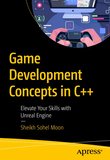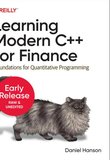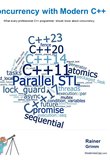-
.NET (.NET Core)
-
1C
-
APL
-
AWK
-
Agda
-
Agile/Scrum
-
Alef
-
Assembler
-
Basic
-
Beta Programming Language
-
Big Data/DataScience
-
C
-
C#
-
C++
-
CSS
-
Cobol
-
Crystal
-
D
-
Dart
-
DataBase (SQL)
-
Delphi
-
F#
-
Flutter
-
Fortran
-
GPT/AI/ИИ
-
GameDev
-
Git
-
Go (Golang)
-
HTML
-
Hacking and Security
-
Haskell
-
Java
-
JavaScript (JS)
-
Julia
-
Kotlin
-
Machine Learning (ML)
-
Natural language processing (NLP)
-
PHP
-
Pascal
-
Python
-
R
-
Ruby
-
Rust
-
Scratch
-
Swift
-
UML
-
UX/UI
-
Visual Basic
-
Wolfram
-
XML
-
АСУ
-
Проектирование/System Design
-
Сети/Network
-
Схемотехника/электронные схемы
-
.NET (.NET Core)
-
1C
-
APL
-
AWK
-
Agda
-
Agile/Scrum
-
Alef
-
Assembler
-
Basic
-
Beta Programming Language
-
Big Data/DataScience
-
C
-
C#
-
C++
-
CSS
-
Cobol
-
Crystal
-
D
-
Dart
-
DataBase (SQL)
-
Delphi
-
F#
-
Flutter
-
Fortran
-
GPT/AI/ИИ
-
GameDev
-
Git
-
Go (Golang)
-
HTML
-
Hacking and Security
-
Haskell
-
Java
-
JavaScript (JS)
-
Julia
-
Kotlin
-
Machine Learning (ML)
-
Natural language processing (NLP)
-
PHP
-
Pascal
-
Python
-
R
-
Ruby
-
Rust
-
Scratch
-
Swift
-
UML
-
UX/UI
-
Visual Basic
-
Wolfram
-
XML
-
АСУ
-
Проектирование/System Design
-
Сети/Network
-
Схемотехника/электронные схемы
Меню
C++ How to Program: An Objects-Natural Approach. 11 Ed
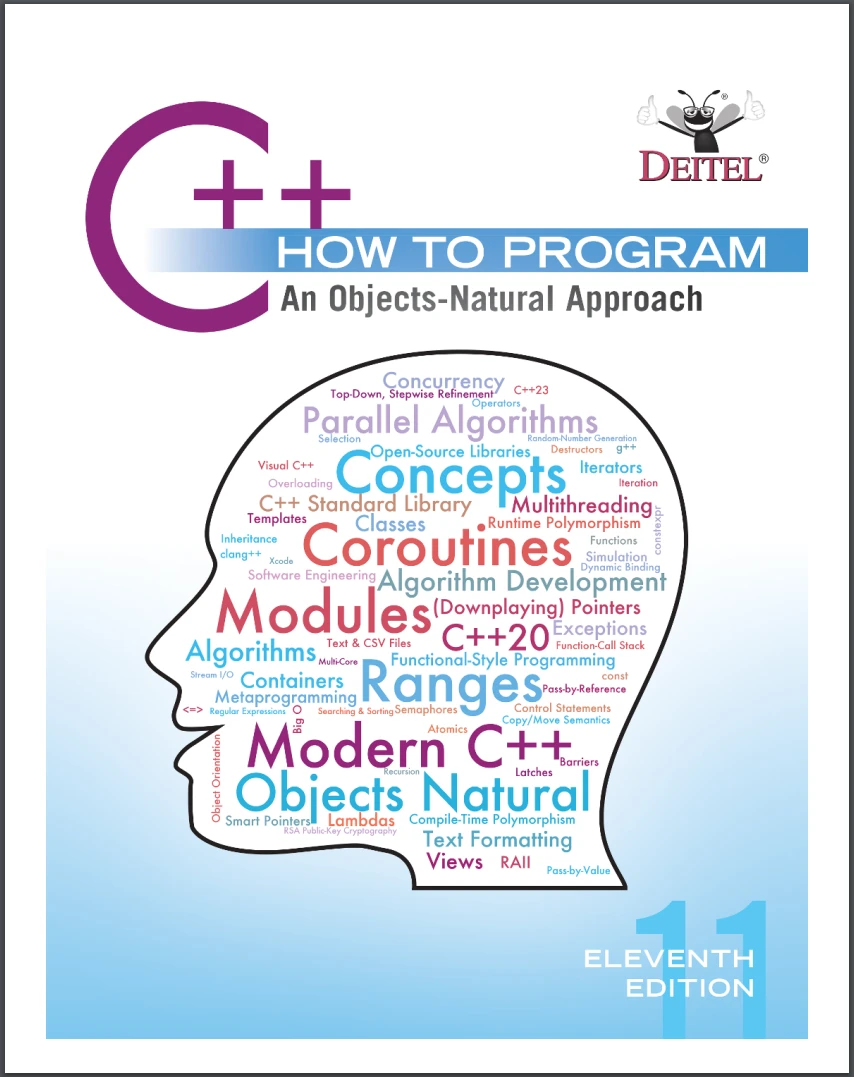
Автор: Deitel Harvey, Deitel Paul
Дата выхода: 2024
Издательство: Pearson Education Limited
Количество страниц: 1364
Размер файла: 9,6 МБ
Тип файла: PDF
Добавил: Федоров_АИ
Preface xxiii
Before You Begin liii
1 Intro to Computers and C++ 1
1.1 Introduction 2
1.2 Hardware 4
1.2.1 Computer Organization 4
1.2.2 Moore’s Law, Multi-Core Processors and Concurrent Programming 7
1.3 Data Hierarchies 10
1.4 Machine Languages, Assembly Languages and High-Level Languages 13
1.5 Operating Systems 14
1.6 C and C++ 18
1.7 C++ Standard Library and Open-Source Libraries 19
1.8 Other Popular Programming Languages 21
1.9 Introduction to Object Orientation 23
1.10 Simplified View of a C++ Development Environment 25
1.11 Test-Driving a C++20 Application Various Ways 28
1.11.1 Compiling and Running on Windows with Visual Studio
Community Edition 29
1.11.2 Compiling and Running with GNU C++ on Linux 32
1.11.3 Compiling and Running with g++ in the GCC Docker Container 34
1.11.4 Compiling and Running with clang++ in a Docker Container 36
1.11.5 Compiling and Running with Xcode on macOS 37
1.12 Internet, World Wide Web, the Cloud and IoT 41
1.12.1 The Internet: A Network of Networks 41
1.12.2 The World Wide Web: Making the Internet User-Friendly 42
1.12.3 The Cloud 42
1.12.4 The Internet of Things (IoT) 42
1.12.5 Edge Computing 43
1.12.6 Mashups 43
1.13 Metaverse 44
1.13.1 Virtual Reality (VR) 44
1.13.2 Augmented Reality (AR) 45
1.13.3 Mixed Reality 46
1.13.4Blockchain 46
1.13.5 Bitcoin and Cryptocurrency 46
1.13.6 Ethereum 47
1.13.7 Non-Fungible Tokens (NFTs) 47
1.13.8 Web3 47
1.14 Software Development Technologies 48
1.15 How Big Is Big Data? 49
1.15.1 Big-Data Analytics 52
1.15.2 Data Science and Big Data Are Making a Difference: Use Cases 53
1.16 AI—at the Intersection of Computer Science and Data Science 54
1.16.1 Artificial Intelligence (AI) 54
1.16.2 Artificial General Intelligence (AGI) 55
1.16.3 Artificial Intelligence Milestones 55
1.16.4 Machine Learning 56
1.16.5 Deep Learning 56
1.16.6 Reinforcement Learning 57
1.16.7 Generative AI—ChatGPT and Dall-E 2 57
1.17Wrap-Up 59
2 Intro to C++20 Programming 65
2.1 Introduction 66
2.2 First Program in C++: Displaying a Line of Text 66
2.3 Modifying Our First C++ Program 70
2.4 Another C++ Program: Adding Integers 71
2.5 Memory Concepts 75
2.6 Arithmetic 76
2.7 Decision Making: Equality and Relational Operators 79
2.8 Objects Natural Case Study:Creating and Using Objects of
Standard-Library Class string 83
2.9 Wrap-Up 86
3 Algorithm Development and Control
Statements: Part 1 93
3.1 Introduction 94
3.2 Algorithms 95
3.3 Pseudocode 95
3.4 Control Structures 96
3.4.1 Sequence Structure 97
3.4.2 Selection Statements 98
3.4.3 Iteration Statements 98
3.4.4 Summary of Control Statements 99
3.5 if Single-Selection Statement 100
3.6 if…else Double-Selection Statement 101
3.6.1 Nested if…else Statements 102
3.6.2 Blocks 104
3.6.3 Conditional Operator (?:) 104
3.7 while Iteration Statement 105
3.8 Formulating Algorithms: Counter-Controlled Iteration 107
3.8.1 Pseudocode Algorithm with Counter-Controlled Iteration 107
3.8.2 Implementing Counter-Controlled Iteration 108
3.8.3 Integer Division and Truncation 110
3.8.4 Arithmetic Overflow 110
3.8.5 Input Validation 110
3.9 Formulating Algorithms: Sentinel-Controlled Iteration 111
3.9.1 Top-Down, Stepwise Refinement: The Top and First Refinement 112
3.9.2 Proceeding to the Second Refinement 112
3.9.3 Implementing Sentinel-Controlled Iteration 114
3.9.4 Mixed-Type Expressions and Implicit Type Promotions 116
3.9.5 Formatting Floating-Point Numbers 117
3.10 Formulating Algorithms: Nested Control Statements 118
3.10.1 Problem Statement 118
3.10.2 Top-Down, Stepwise Refinement: Pseudocode Representation
of the Top 119
3.10.3 Top-Down, Stepwise Refinement: First Refinement 119
3.10.4 Top-Down, Stepwise Refinement: Second Refinement 120
3.10.5 Complete Second Refinement of the Pseudocode 120
3.10.6 Implementing the Program 121
3.10.7 Preventing Narrowing Conversions with Braced Initialization 123
3.11 Compound Assignment Operators 125
3.12 Increment and Decrement Operators 125
3.13 Fundamental Types Are Not Portable 128
3.14 Objects Natural Case Study: Super-Sized Integers 129
3.15Wrap-Up 134
4 Control Statements, Part 2 145
4.1 Introduction 146
4.2 Essentials of Counter-Controlled Iteration 146
4.3 for Iteration Statement 148
4.4 Examples Using the for Statement 151
4.5 Application: Summing Even Integers; Introducing
C++20 Text Formatting 152
4.6 Application: Compound-Interest Calculations;
Introducing Format Specifiers 153
4.7 do…while Iteration Statement 158
4.8 switch Multiple-Selection Statement 159
4.9 Selection Statements with Initializers 165
4.10 break and continue Statements 167
4.11 Logical Operators 169
4.11.1 Logical AND (&&) Operator 169
4.11.2 Logical OR (||) Operator 170
4.11.3 Short-Circuit Evaluation 170
4.11.4 Logical Negation (!) Operator 171
4.11.5 Example: Producing Logical-Operator Truth Tables 171
4.12 Confusing the Equality (==) and Assignment (=) Operators 173
4.13 Structured-Programming Summary 175
4.14 Objects Natural Case Study: Precise Monetary Calculations with
the Boost Multiprecision Library 180
4.15Wrap-Up 183
5 Functions and an Intro to Function Templates 189
5.1 Introduction 190
5.2 C++ Program Components 191
5.3 Math Library Functions 192
5.4 Function Definitions and Function Prototypes 194
5.5 Order of Evaluation of a Function’s Arguments 197
5.6 Function-Prototype and Argument-Coercion Notes 197
5.6.1 Function Signatures and Function Prototypes 198
5.6.2 Argument Coercion 198
5.6.3 Argument-Promotion Rules and Implicit Conversions 198
5.7 C++ Standard Library Headers 200
5.8 Case Study: Random-Number Generation 203
5.8.1 Rolling a Six-Sided Die 204
5.8.2 Rolling a Six-Sided Die 60,000,000 Times 205
5.8.3 Seeding the Random-Number Generator 207
5.8.4 Seeding the Random-Number Generator with random_device 208
5.9 Case Study: Game of Chance; Introducing Scoped enums 209
5.10 Function-Call Stack and Activation Records 214
5.11 Inline Functions 217
5.12 References and Reference Parameters 219
5.13 Default Arguments 222
5.14 Function Overloading 224
5.15 Function Templates 227
5.16Recursion 229
5.16.1 Factorials 230
5.16.2 Recursive Factorial Example 230
5.16.3 Recursive Fibonacci Series Example 234
5.16.4 Recursion vs. Iteration 237
5.17 Scope Rules 239
5.18 Unary Scope Resolution Operator 244
5.19 Lnfylun Lhqtomh Wjtz Qarcv: Qjwazkrplm xzz Xndmwwqhlz 245
5.20Wrap-Up 248
6 arrays, vectors, Ranges and
Functional-Style Programming 259
6.1 Introduction 260
6.2 arrays 261
6.3 Declaring arrays 262
6.4 Initializing array Elements in a Loop 262
6.5 Initializing an array with an Initializer List 265
6.6 Range-Based for Statement 267
6.7 Calculating array Element Values and an Intro to constexpr 269
6.8 Totaling array Elements 271
6.9 Using a Primitive Bar Chart to Display array Data Graphically 272
6.10 Using array Elements as Counters 274
6.11 Using arrays to Summarize Survey Results 275
6.12 Sorting and Searching arrays 277
6.13 Multidimensional arrays 279
6.14 Intro to Functional-Style Programming 283
6.14.1 What vs. How 283
6.14.2 Passing Functions as Arguments to Other Functions:
Introducing Lambda Expressions 284
6.14.3 Filter, Map and Reduce: Intro to C++20’s Ranges Library 286
6.15 Objects-Natural Case Study: C++ Standard Library
Class Template vector 290
6.16Wrap-Up 297
7 (Downplaying) Pointers in Modern C++ 309
7.1 Introduction 310
7.2 Pointer Variable Declarations and Initialization 312
7.2.1 Declaring Pointers 312
7.2.2 Initializing Pointers 312
7.2.3 Null Pointers 312
7.3 Pointer Operators 313
7.3.1 Address (&) Operator 313
7.3.2 Indirection (*) Operator 314
7.3.3 Using the Address (&) and Indirection (*) Operators 315
7.4 Pass-by-Reference with Pointers 316
7.5 Built-In Arrays 320
7.5.1 Declaring and Accessing a Built-In Array 320
7.5.2 Initializing Built-In Arrays 321
7.5.3 Passing Built-In Arrays to Functions 322
7.5.4 Declaring Built-In Array Parameters 322
7.5.5 Standard Library Functions begin and end 323
7.5.6 Built-In Array Limitations 323
7.6 Using C++20 to_array to Convert a Built-in Array to a std::array 324
7.7 Using const with Pointers and the Data Pointed To 325
7.7.1 Using a Nonconstant Pointer to Nonconstant Data 326
7.7.2 Using a Nonconstant Pointer to Constant Data 326
7.7.3 Using a Constant Pointer to Nonconstant Data 327
7.7.4 Using a Constant Pointer to Constant Data 327
7.8 sizeof Operator 329
7.9 Pointer Expressions and Pointer Arithmetic 331
7.9.1 Adding Integers to and Subtracting Integers from Pointers 332
7.9.2 Subtracting One Pointer from Another 333
7.9.3 Pointer Assignment 333
7.9.4 Cannot Dereference a void* Pointer 333
7.9.5 Comparing Pointers 334
7.10 Objects-Natural Case Study: C++20 spans—Views of Contiguous
Container Elements 334
7.11 A Brief Intro to Pointer-Based Strings 340
7.11.1 Command-Line Arguments 341
7.11.2 Revisiting C++20’s to_array Function 342
7.12 Looking Ahead to Other Pointer Topics 344
7.13Wrap-Up 344
8 strings, string_views, Text Files,
CSV Files and Regex 357
8.1 Introduction 358
8.2 string Assignment and Concatenation 359
8.3 Comparing strings 361
8.4 Substrings 363
8.5 Swapping strings 364
8.6 string Characteristics 365
8.7 Finding Substrings and Characters in a string 367
8.8 Replacing and Erasing Characters in a string 370
8.9 Inserting Characters into a string 372
8.10 Numeric Conversions 373
8.11 string_view 374
8.12 Files and Streams 377
8.13 Creating a Sequential File 378
8.14 Reading Data from a Sequential File 381
8.15 Reading and Writing Quoted Text 384
8.16 Updating Sequential Files 385
8.17 String Stream Processing 386
8.18 Raw String Literals 389
8.19 Objects-Natural Data Science Case Study: Reading and Analyzing a
CSV File Containing Titanic Disaster Data 390
8.19.1 Using rapidcsv to Read the Contents of a CSV File 390
8.19.2 Reading and Analyzing the Titanic Disaster Dataset 392
8.20 Objects-Natural Data Science Case Study: Intro to Regular Expressions 399
8.20.1 Matching Complete Strings to Patterns 400
8.20.2 Replacing Substrings 405
8.20.3 Searching for Matches 405
8.21Wrap-Up 408
9 Custom Classes 431
9.1 Introduction 432
9.2 Test-Driving an Account Object 433
9.3 Account Class with a Data Member and Set and Get Member Functions 435
9.3.1 Class Definition 435
9.3.2 Access Specifiers private and public 437
9.4 Account Class: Custom Constructors 438
9.5 Software Engineering with Set and Get Member Functions 442
9.6 Account Class with a Balance 444
9.7 Time Class Case Study: Separating Interface from Implementation 447
9.7.1 Interface of a Class 448
9.7.2 Separating the Interface from the Implementation 448
9.7.3 Class Definition 449
9.7.4 Member Functions 450
9.7.5 Including the Class Header in the Source-Code File 450
9.7.6 Scope Resolution Operator (::) 451
9.7.7 Member Function setTime and Throwing Exceptions 451
9.7.8 Member Functions to24HourString and to12HourString 451
9.7.9 Implicitly Inlining Member Functions 452
9.7.10 Member Functions vs. Global Functions 452
9.7.11 Using Class Time 452
9.7.12 Object Size 454
9.8 Compilation and Linking Process 454
9.9 Class Scope and Accessing Class Members 455
9.10 Access Functions and Utility Functions 456
9.11 Time Class Case Study: Constructors with Default Arguments 457
9.11.1 Class Time 457
9.11.2 Overloaded Constructors and Delegating Constructors 462
9.12 Destructors 463
9.13 When Constructors and Destructors Are Called 464
9.14 Time Class Case Study: A Subtle Trap — Returning a Reference or a
Pointer to a private Data Member 468
9.15 Default Assignment Operator 470
9.16 const Objects and const Member Functions 472
9.17 Composition: Objects as Members of Classes 474
9.18 friend Functions and friend Classes 480
9.19 The this Pointer 482
9.19.1 Implicitly and Explicitly Using the this Pointer to Access
an Object’s Data Members 482
9.19.2 Using the this Pointer to Enable Cascaded Function Calls 484
9.20 static Class Members: Classwide Data and Member Functions 487
9.21 Aggregates in C++20 492
9.21.1 Initializing an Aggregate 493
9.21.2 C++20 Designated Initializers 493
9.22 Concluding Our Objects Natural Case Study Track: Studying the
Vigenère Secret-Key Cipher Implementation 494
9.23Wrap-Up 507
10 OOP: Inheritance and Runtime Polymorphism 529
10.1 Introduction 530
10.2 Base Classes and Derived Classes 532
10.2.1 CommunityMember Class Hierarchy 533
10.2.2 Shape Class Hierarchy and public Inheritance 534
10.3 Relationship Between Base and Derived Classes 535
10.3.1 Creating and Using a SalariedEmployee Class 535
10.3.2 Creating a SalariedEmployee–SalariedCommissionEmployee
Inheritance Hierarchy 538
10.4 Constructors and Destructors in Derived Classes 544
10.5 Intro to Runtime Polymorphism: Polymorphic Video Game 545
10.6 Relationships Among Objects in an Inheritance Hierarchy 546
10.6.1 Invoking Base-Class Functions from Derived-Class Objects 547
10.6.2 Aiming Derived-Class Pointers at Base-Class Objects 549
10.6.3 Derived-Class Member-Function Calls via Base-Class Pointers 550
10.7 Virtual Functions and Virtual Destructors 551
10.7.1 Why virtual Functions Are Useful 551
10.7.2 Declaring virtual Functions 552
10.7.3 Invoking a virtual Function 553
10.7.4 virtual Functions in the SalariedEmployee Hierarchy 553
10.7.5 virtual Destructors 557
10.7.6 final Member Functions and Classes 557
10.8 Abstract Classes and Pure virtual Functions 558
10.8.1 Pure virtual Functions 559
10.8.2 Device Drivers: Polymorphism in Operating Systems 559
10.9 Case Study: Payroll System Using Runtime Polymorphism 560
10.9.1 Creating Abstract Base Class Employee 561
10.9.2 Creating Concrete Derived Class SalariedEmployee 563
10.9.3 Creating Concrete Derived Class CommissionEmployee 565
10.9.4 Demonstrating Runtime Polymorphic Processing 567
10.10 Runtime Polymorphism, Virtual Functions and Dynamic Binding
“Under the Hood” 570
10.11 Program to an Interface, Not an Implementation 573
10.11.1 Rethinking the Employee Hierarchy—
CompensationModel Interface 575
10.11.2 Class Employee 575
10.11.3 CompensationModel Implementations 577
10.11.4 Testing the New Hierarchy 579
10.11.5 Dependency Injection Design Benefits 580
10.12 Wrap-Up 581
11 Operator Overloading,
Copy/Move Semantics and Smart Pointers 587
11.1 Introduction 588
11.2 Using the Overloaded Operators of Standard Library Class string 590
11.3 Operator Overloading Fundamentals 596
11.3.1 Operator Overloading Is Not Automatic 596
11.3.2 Operators That Cannot Be Overloaded 596
11.3.3 Operators That You Do Not Have to Overload 596
11.3.4 Rules and Restrictions on Operator Overloading 597
11.4 (Downplaying) Dynamic Memory Management with new and delete 598
11.5 Modern C++ Dynamic Memory Management: RAII and Smart Pointers 600
11.5.1 Smart Pointers 601
11.5.2 Demonstrating unique_ptr 601
11.5.3 unique_ptr Ownership 603
11.5.4 unique_ptr to a Built-In Array 603
11.6 MyArray Case Study: Crafting a Valuable Class with Operator Overloading 604
11.6.1 Special Member Functions 605
11.6.2 Using Class MyArray 606
11.6.3 MyArray Class Definition 615
11.6.4 Constructor That Specifies a MyArray’s Size 617
11.6.5 Passing a Braced Initializer to a Constructor 618
11.6.6 Copy Constructor and Copy Assignment Operator 619
11.6.7 Move Constructor and Move Assignment Operator 622
11.6.8 Destructor 626
11.6.9 toString and size Functions 626
11.6.10 Overloading the Equality (==) and Inequality (!=) Operators 627
11.6.11 Overloading the Subscript ([]) Operator 629
11.6.12 Overloading the Unary bool Conversion Operator 630
11.6.13 Overloading the Preincrement Operator 631
11.6.14 Overloading the Postincrement Operator 632
11.6.15 Overloading the Addition Assignment Operator (+=) 633
11.6.16 Overloading the Binary Stream Extraction (>>) and
Stream Insertion (<<) Operators 633
11.6.17 friend Function swap 636
11.7 C++20 Three-Way Comparison Operator (<=>) 636
11.8 Converting Between Types 640
11.9 explicit Constructors and Conversion Operators 641
11.10 Overloading the Function Call Operator () 644
11.11 Wrap-Up 644
12 Exceptions and a Look Forward to Contracts 653
12.1 Introduction 654
12.2 Exception-Handling Flow of Control 658
12.2.1 Defining a Custom Exception Class 658
12.2.2 Demonstrating Exception Handling 659
12.2.3 Enclosing Code in a try Block 660
12.2.4 Defining a catch Handler for DivideByZeroExceptions 661
12.2.5 Termination Model of Exception Handling 662
12.2.6 Flow of Control When the User Enters a Nonzero Denominator 663
12.2.7 Flow of Control When the User Enters a Zero Denominator 663
12.3 Exception Safety Guarantees and noexcept 664
12.4 Rethrowing an Exception 665
12.5 Stack Unwinding and Uncaught Exceptions 667
12.6 When to Use Exception Handling 669
12.6.1 assert Macro 671
12.6.2 Failing Fast 671
12.7 Constructors, Destructors and Exception Handling 672
12.7.1 Throwing Exceptions from Constructors 672
12.7.2 Catching Exceptions in Constructors via Function try Blocks 673
12.7.3 Exceptions and Destructors: Revisiting noexcept(false) 675
12.8 Processing new Failures 676
12.8.1 new Throwing bad_alloc on Failure 677
12.8.2 new Returning nullptr on Failure 678
12.8.3 Handling new Failures Using Function set_new_handler 679
12.9 Standard Library Exception Hierarchy 680
12.10 C++’s Alternative to the finally Block: Resource Acquisition Is
Initialization (RAII) 683
12.11 Some Libraries Support Both Exceptions and Error Codes 683
12.12 Logging 685
12.13 Looking Ahead to Contracts 685
12.14 Wrap-Up 694
13 Data Structures: Standard Library Containers
and Iterators 697
13.1 Introduction 698
13.2 A Brief Intro to Big O 700
13.3 A Brief Intro to Hash Tables 703
13.4 Introduction to Containers 704
13.4.1 Common Nested Types in Sequence and Associative Containers 706
13.4.2 Common Container Member and Non-Member Functions 707
13.4.3 Requirements for Container Elements 710
13.5 Working with Iterators 710
13.5.1 Using istream_iterator for Input and ostream_iterator
for Output 710
13.5.2 Iterator Categories 712
13.5.3 Container Support for Iterators 712
13.5.4 Predefined Iterator Type Names 713
13.5.5 Iterator Operators 713
13.6 A Brief Introduction to Algorithms 714
13.7 Sequence Containers 715
13.8 vector Sequence Container 715
13.8.1 Using vectors and Iterators 716
13.8.2 vector Element-Manipulation Functions 719
13.9 list Sequence Container 723
13.10 deque Sequence Container 728
13.11 Associative Containers 730
13.11.1 multiset Associative Container 730
13.11.2 set Associative Container 734
13.11.3 multimap Associative Container 736
13.11.4 map Associative Container 738
13.12 Container Adaptors 739
13.12.1 stack Adaptor 740
13.12.2 queue Adaptor 742
13.12.3 priority_queue Adaptor 743
13.13 bitset Near Container 744
13.14 Wrap-Up 746
14 Standard Library Algorithms and
C++20 Ranges & Views 773
14.1 Introduction 774
14.2 Algorithm Requirements: C++20 Concepts 776
14.3 Lambdas and Algorithms 778
14.4Algorithms 781
14.4.1 fill, fill_n, generate and generate_n 781
14.4.2 equal, mismatch and lexicographical_compare 783
14.4.3 remove, remove_if, remove_copy and remove_copy_if 786
14.4.4 replace, replace_if, replace_copy and replace_copy_if 790
14.4.5 Shuffling, Counting, and Minimum and Maximum
Element Algorithms 792
14.4.6 Searching and Sorting Algorithms 796
14.4.7 swap, iter_swap and swap_ranges 800
14.4.8 copy_backward, merge, unique, reverse, copy_if and copy_n 802
14.4.9 inplace_merge, unique_copy and reverse_copy 805
14.4.10 Set Operations 807
14.4.11 lower_bound, upper_bound and equal_range 810
14.4.12 min, max and minmax 812
14.4.13 Algorithms gcd, lcm, iota, reduce and partial_sum from
Header <numeric> 813
14.4.14 Heapsort and Priority Queues 816
14.5 Function Objects (Functors) 821
14.6 Projections 825
14.7 C++20 Views and Functional-Style Programming 828
14.7.1 Range Adaptors 828
14.7.2 Working with Range Adaptors and Views 830
14.8 Intro to Parallel Algorithms 834
14.9 Standard Library Algorithm Summary 836
14.10 Future Ranges Enhancements 839
14.11 Wrap-Up 840
15 Templates, C++20 Concepts and
Metaprogramming 845
15.1 Introduction 846
15.2 Custom Class Templates and Compile-Time Polymorphism 849
15.3 C++20 Function Template Enhancements 854
15.3.1 C++20 Abbreviated Function Templates 854
15.3.2 C++20 Templated Lambdas 856
15.4 C++20 Concepts: A First Look 856
15.4.1 Unconstrained Function Template multiply 857
15.4.2 Constrained Function Template with a C++20 Concepts
requires Clause 860
15.4.3 C++20 Predefined Concepts 862
15.5 Type Traits 864
15.6 C++20 Concepts: A Deeper Look 868
15.6.1 Creating a Custom Concept 868
15.6.2 Using a Concept 869
15.6.3 Using Concepts in Abbreviated Function Templates 870
15.6.4 Concept-Based Overloading 871
15.6.5 requires Expressions 874
15.6.6 C++20 Exposition-Only Concepts 877
15.6.7 Techniques Before C++20 Concepts: SFINAE and Tag Dispatch 878
15.7 Testing C++20 Concepts with static_assert 879
15.8 Creating a Custom Algorithm 881
15.9 Creating a Custom Container and Iterators 883
15.9.1 Class Template ConstIterator 885
15.9.2 Class Template Iterator 888
15.9.3 Class Template MyArray 890
15.9.4 MyArray Deduction Guide for Braced Initialization 893
15.9.5 Using MyArray with std::ranges Algorithms 894
15.10 Default Arguments for Template Type Parameters 898
15.11 Variable Templates 898
15.12 Variadic Templates and Fold Expressions 899
15.12.1 tuple Variadic Class Template 899
15.12.2 Variadic Function Templates and an Intro to Fold Expressions 902
15.12.3 Types of Fold Expressions 906
15.12.4 How Unary Fold Expressions Apply Their Operators 906
15.12.5 How Binary-Fold Expressions Apply Their Operators 909
15.12.6 Using the Comma Operator to Repeatedly Perform an Operation 910
15.12.7 Constraining Parameter Pack Elements to the Same Type 911
15.13 Template Metaprogramming 913
15.13.1 C++ Templates Are Turing Complete 914
15.13.2 Computing Values at Compile-Time 914
15.13.3 Conditional Compilation with Template Metaprogramming
and constexpr if 919
15.13.4 Type Metafunctions 921
15.14 Wrap-Up 925
16 C++20 Modules: Large-Scale Development 933
16.1 Introduction 934
16.2 Compilation and Linking Before C++20 936
16.3 Advantages and Goals of Modules 937
16.4 Example: Transitioning to Modules—Header Units 938
16.5 Modules Can Reduce Translation Unit Sizes and Compilation Times 941
16.6 Example: Creating and Using a Module 942
16.6.1 module Declaration for a Module Interface Unit 943
16.6.2 Exporting a Declaration 945
16.6.3 Exporting a Group of Declarations 945
16.6.4 Exporting a namespace 945
16.6.5 Exporting a namespace Member 946
16.6.6 Importing a Module to Use Its Exported Declarations 946
16.6.7 Example: Attempting to Access Non-Exported Module Contents 948
16.7 Global Module Fragment 951
16.8 Separating Interface from Implementation 951
16.8.1 Example: Module Implementation Units 951
16.8.2 Example: Modularizing a Class 954
16.8.3 :private Module Fragment 958
16.9Partitions 958
16.9.1 Example: Module Interface Partition Units 959
16.9.2 Module Implementation Partition Units 962
16.9.3 Example: “Submodules” vs. Partitions 962
16.10 Additional Modules Examples 967
16.10.1 Example: Importing the C++ Standard Library as Modules 967
16.10.2 Example: Cyclic Dependencies Are Not Allowed 969
16.10.3 Example: imports Are Not Transitive 970
16.10.4 Example: Visibility vs. Reachability 971
16.11 Migrating Code to Modules 972
16.12 Future of Modules and Modules Tooling 973
16.13 Wrap-Up 975
17 Parallel Algorithms and Concurrency:
A High-Level View 987
17.1 Introduction 988
17.2 Standard Library Parallel Algorithms 991
17.2.1 Example: Profiling Sequential and Parallel Sorting Algorithms 991
17.2.2 When to Use Parallel Algorithms 994
17.2.3 Execution Policies 995
17.2.4 Example: Profiling Parallel and Vectorized Operations 996
17.2.5 Additional Parallel Algorithm Notes 998
17.3 Multithreaded Programming 999
17.3.1 Thread States and the Thread Life Cycle 999
17.3.2 Deadlock and Indefinite Postponement 1001
17.4 Launching Tasks with std::jthread 1003
17.4.1 Defining a Task to Perform in a Thread 1003
17.4.2 Executing a Task in a jthread 1005
17.4.3 How jthread Fixes thread 1007
17.5 Producer–Consumer Relationship: A First Attempt 1008
17.6 Producer–Consumer: Synchronizing Access to Shared Mutable Data 1015
17.6.1 Class SynchronizedBuffer: Mutexes, Locks and
Condition Variables 1017
17.6.2 Testing SynchronizedBuffer 1023
17.7 Producer–Consumer: Minimizing Waits with a Circular Buffer 1027
17.8 Readers and Writers 1036
17.9 Cooperatively Canceling jthreads 1037
17.10 Launching Tasks with std::async 1040
17.11 Thread-Safe, One-Time Initialization 1047
17.12 A Brief Introduction to Atomics 1048
17.13 Coordinating Threads with C++20 Latches and Barriers 1052
17.13.1 C++20 std::latch 1052
17.13.2 C++20 std::barrier 1055
17.14 C++20 Semaphores 1058
17.15 C++23: A Look to the Future of C++ Concurrency 1062
17.15.1 Parallel Ranges Algorithms 1062
17.15.2 Concurrent Containers 1062
17.15.3 Other Concurrency-Related Proposals 1063
17.16 Wrap-Up 1063
18 C++20 Coroutines 1073
18.1 Introduction 1074
18.2 Coroutine Support Libraries 1075
18.3 Installing the concurrencpp and generator Libraries 1077
18.4 Creating a Generator Coroutine with co_yield and
the generator Library 1077
18.5 Launching Tasks with concurrencpp 1081
18.6 Creating a Coroutine with co_await and co_return 1085
18.7 Low-Level Coroutines Concepts 1093
18.8 Future Coroutines Enhancements 1096
18.9Wrap-Up 1096
19 Stream I/O & C++20 Text Formatting 1101
19.1 Introduction 1102
19.2 Streams 1102
19.2.1 Classic Streams vs. Standard Streams 1103
19.2.2 iostream Library Headers 1103
19.2.3 Stream Input/Output Classes and Objects 1103
19.3 Stream Output 1104
19.3.1 Output of char* Variables 1105
19.3.2 Character Output Using Member Function put 1106
19.4 Stream Input 1106
19.4.1 get and getline Member Functions 1106
19.4.2 istream Member Functions peek, putback and ignore 1109
19.5 Unformatted I/O Using read, write and gcount 1110
19.6 Stream Manipulators 1111
19.6.1 Integral Stream Base: dec, oct, hex and setbase 1112
19.6.2 Floating-Point Precision (setprecision, precision) 1112
19.6.3 Field Width (width, setw) 1114
19.6.4 User-Defined Output Stream Manipulators 1115
19.6.5 Trailing Zeros and Decimal Points (showpoint) 1116
19.6.6 Alignment (left, right and internal) 1117
19.6.7 Padding (fill, setfill) 1118
19.6.8 Integral Stream Base (dec, oct, hex, showbase) 1119
19.6.9 Floating-Point Numbers; Scientific and Fixed Notation
(scientific, fixed) 1120
19.6.10 Uppercase/Lowercase Control (uppercase) 1121
19.6.11 Specifying Boolean Format (boolalpha) 1122
19.6.12 Setting and Resetting the Format State via Member
Function flags 1123
19.7 Stream Error States 1124
19.8 Tying an Output Stream to an Input Stream 1127
19.9 C++20 Text Formatting 1127
19.9.1 C++20 std::format Presentation Types 1128
19.9.2 C++20 std::format Field Widths and Alignment 1130
19.9.3 C++20 std::format Numeric Formatting 1131
19.9.4 C++20 std::format Field Width and Precision Placeholders 1132
19.10 Wrap-Up 1133
20 Other Topics and a Look Toward the
Future of C++ 1141
20.1 Introduction 1142
20.2 shared_ptr and weak_ptr Smart Pointers 1143
20.2.1 Reference Counted shared_ptr 1143
20.2.2 weak_ptr: shared_ptr Observer 1147
20.3 Runtime Polymorphism with std::variant and std::visit 1154
20.4 protected Class Members: A Deeper Look 1160
20.5 Non-Virtual Interface (NVI) Idiom 1161
20.6 Inheriting Base-Class Constructors 1168
20.7 Multiple Inheritance 1169
20.7.1 Diamond Inheritance 1174
20.7.2 Eliminating Duplicate Subobjects with virtual
Base-Class Inheritance 1176
20.8 public, protected and private Inheritance 1177
20.9 namespaces: A Deeper Look 1179
20.9.1 Defining namespaces 1180
20.9.2 Accessing namespace Members with Qualified Names 1181
20.9.3 using Directives Should Not Be Placed in Headers 1181
20.9.4 Nested Namespaces 1181
20.9.5 Aliases for namespace Names 1181
20.10 Storage Classes and Storage Duration 1182
20.10.1 Storage Duration 1182
20.10.2 Local Variables and Automatic Storage Duration 1182
20.10.3 Static Storage Duration 1183
20.10.4 mutable Class Members 1184
20.11 Operator Keywords 1185
20.12 decltype Operator 1186
20.13 Trailing Return Types for Functions 1187
20.14 [[nodiscard]] Attribute 1187
20.15 Some Key C++23 Features 1189
20.16 Wrap-Up 1194
21 Computer Science Thinking:
Searching, Sorting and Big O 1197
21.1 Introduction 1198
21.2 Efficiency of Algorithms: Big O 1199
21.2.1 O(1) Algorithms 1199
21.2.2 O(n) Algorithms 1199
21.2.3 O(n2) Algorithms 1200
21.3 Linear Search 1201
21.3.1 Implementation 1201
21.3.2 Efficiency of Linear Search 1202
21.4 Binary Search 1203
21.4.1 Implementation 1203
21.4.2 Efficiency of Binary Search 1207
21.5 Insertion Sort 1208
21.5.1 Implementation 1209
21.5.2 Efficiency of Insertion Sort 1210
21.6 Selection Sort 1210
21.6.1 Implementation 1211
21.6.2 Efficiency of Selection Sort 1213
21.7 Merge Sort (A Recursive Implementation) 1213
21.7.1 Implementation 1214
21.7.2 Efficiency of Merge Sort 1219
21.7.3 Summarizing Various Algorithms’ Big O Notations 1219
21.8Wrap-Up 1221
Index 1225
C++ How to Program: An Objects-Natural Approach is a code-intensive, modular introduction to C++ programming. The Deitel live-code approach presents concepts using full working programs rather than code snippets so that you can immediately start to run programs as you read. Interesting, entertaining, and challenging examples, exercises, and projects help you see how what you're learning applies to real-world scenarios.
The 11th Edition presents new features of C++ 20 and even more hands-on application opportunities. Hundreds of new self-checks let you test your code and understanding of key concepts. New case studies and exercises focus on security, data science, ethics, and more.
